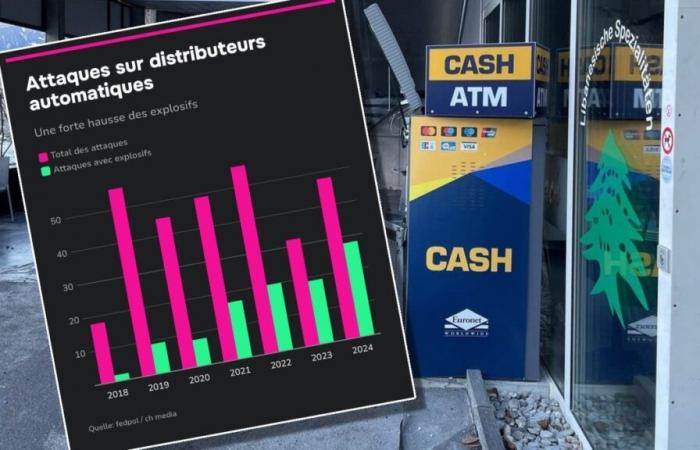In Switzerland, 48 attacks against ATMs were recorded in 2024, i.e. +50% compared to 2023. An increase in the use of explosives alarms the authorities.
Kari Kälin / ch media
At the very end of the year, they struck again. Last Sunday, shortly before 3 a.m., unknown persons blew up an ATM in Zizers (GR). They stole cash and caused considerable material damage, said the cantonal police. She opened an investigation with the Federal Police Office (Fedpol) and under the direction of the Federal Prosecutor’s Office. The latter is responsible for crimes related to explosives.
Unknown persons blew up an ATM in Zizers.Image: Graubünden police
Since 2018, ATMs have been increasingly in the crosshairs of criminals in Switzerland. In 2022, Fedpol recorded a peak of 57 attacks. The following year, the situation improved somewhat (32 attacks) before worsening again in 2024 (48 attacks). The thugs operate with explosives or gas. They also force the machines, tear off the banknote cassettes using a rope or tamper with the software, which then gives the order to spit out banknotes.
The recent events in Zizers illustrate a worrying development: this year, explosives were used in 28 cases – a record. This type of modern heist is particularly dangerous because debris ejected during the explosion can reach uninvolved bystanders. Some ATMs are located in apartment buildings.
Ink makes money unusable
On average, this represents one attack per week in our country. Enough to worry politicians. “Statistics show that we are not able to stem this phenomenon,” declared Vaudois national councilor Olivier Feller (PLR) during the fall session. However, a solution exists: it would be enough to equip the machines with an anti-theft device, in particular with ink which would automatically spray the banknotes and thus make them unusable:
“Several countries such as Ireland, Belgium, France and Sweden have introduced such an obligation, which is proving effective”

In 2022, the Zurich Forensic Institute and fedpol have carried out explosion tests on vending machines, it is violent. Image: fedpol
By 146 votes to 36, the National Council approved a postulate from Olivier Feller which calls for better protection against this phenomenon. Justice Minister Beat Jans argued that a single measure was not enough to increase security. This is why Fedpol continues its collaboration on prevention with banks, ATM operators and cantonal police. Objective: to develop “best practices” together. The Federal Council says it observes positive trends and therefore rejects Feller’s intervention.
Fedpol, for its part, recently reported on these positive trends on Linkedin. Thus, in 2024, cash could be recovered in less than half of the cases. And Fedpol elucidated, in September, one of the largest investigations against the perpetrators of ATM attacks in cooperation with Paris and Berlin. French police have arrested thirteen men who are suspected of blowing up dozens of machines in France, Germany and Switzerland. They had gotten their hands on several hundred thousand francs.
This organized gang has its headquarters in the Netherlands. This is where the criminal networks operate, whose members generally come from Moroccan migration. It is these groups and Romanian gangs who commit most of the explosive attacks in Switzerland.
As soon as they arrive, they are immediately eclipsed
According to the authorities, the operations are increasingly violent. They last only a few minutes and are carried out by three or four people. Investigations indicate that these crime specialists rent premises abroad, almost like a logistics base, then cross the border in stolen cars: they arrive, they blow up everything and disappear in the blink of an eye.
Banks are not sitting idly by. Some already rely on vandal-proof ink, better protect their dispensers with rolling shutters or deposit less liquid there. In May, after a series of attacks, the cantonal banks of Neuchâtel and Jura did not hesitate to close several devices located mostly on the outskirts. Switzerland nevertheless seems to be of particular interest to thieves. According to the Federal Police Office, the smallness of the territory and the density of the network of distributors explain this attraction.
(French adaptation: Valentine Zenker)








